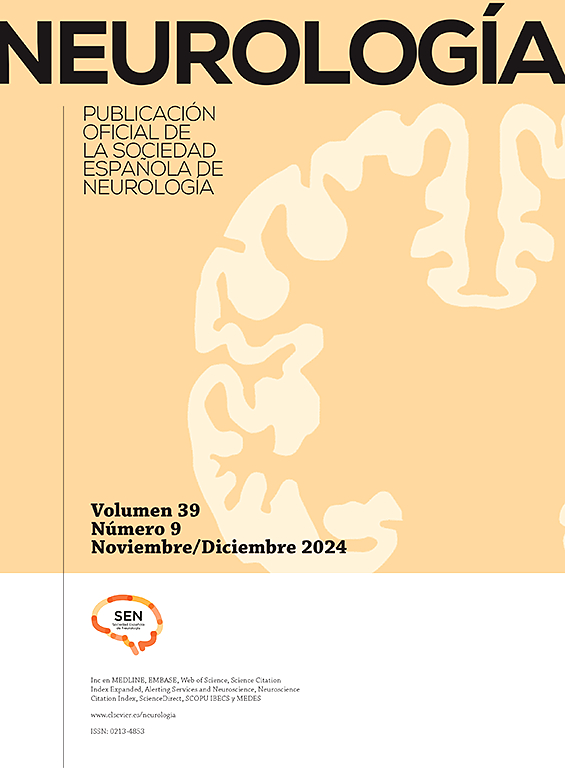心理弹性在多发性硬化症患者的感知神经心理障碍和生活质量之间起中介作用
IF 3.1
4区 医学
Q2 CLINICAL NEUROLOGY
引用次数: 0
摘要
主观认知问题(SCCs)对多发性硬化症(PwMS)患者生活质量(QoL)的影响实际上尚未研究。目的探讨PwMS患者主观认知问题与生活质量的关系。进一步探讨心理弹性是否在SCCs与生活质量的关系中起中介作用。方法采用多发性硬化症生活质量量表、多发性硬化症神经心理学问卷(MSNQ)和Connor-Davidson弹性量表对214例多发性硬化症患者进行调查。结果我们的研究结果表明,SCCs是PwMS患者感知生活质量水平的预测因子。总体而言,MSNQ得分较高的患者也表现出较差的生活质量。结果还表明,弹性在生活质量的物理维度(身体健康复合维度)和心理健康维度(心理健康复合维度)中都介导了SCCs与生活质量之间的关系。在我们的患者中,随着恢复能力水平的提高,SCCs对生活质量的负面影响降低。结论弹性是一种可改变的保护因素,实施旨在增强弹性的干预措施可对多发性硬化症患者的心理健康和生活质量产生有利影响。本文章由计算机程序翻译,如有差异,请以英文原文为准。
Psychological resilience mediates the relationship between perceived neuropsychological impairment and quality of life in a sample of patients with multiple sclerosis
Introduction
The impact of subjective cognitive concerns (SCCs) on the quality of life (QoL) of patients with multiple sclerosis (PwMS) has practically not been studied.
Objectives
In this study, the relationship between subjective cognitive concerns and quality of life in PwMS was explored. Furthermore, to explore whether psychological resilience acts as a mediator in the relationship between SCCs and QoL.
Methods
A total of 214 PwMS were surveyed using the Multiple Sclerosis Quality of Life Inventory, the Multiple Sclerosis Neuropsychological Questionnaire (MSNQ) and the Connor-Davidson Resilience Scale.
Results
Our results showed that, SCCs is a predictor of levels of perceived QoL in PwMS. Patients who report higher scores on the MSNQ also showed a worse quality of life in global terms. The results also showed that resilience mediates the relationship between SCCs and QoL, both for the physical dimension of quality of life (physical health composite) and for the mental health dimension (mental health composite). In our patients, as resilience levels increase, the negative impact of SCCs on QoL decreases.
Conclusions
Considering that resilience is a modifiable protective factor, the implementation of interventions aimed at enhancing resilience can have a favorable impact on the psychological well-being and quality of life of patients with multiple sclerosis.
求助全文
通过发布文献求助,成功后即可免费获取论文全文。
去求助
来源期刊

Neurologia
医学-临床神经学
CiteScore
5.90
自引率
2.60%
发文量
135
审稿时长
48 days
期刊介绍:
Neurología es la revista oficial de la Sociedad Española de Neurología y publica, desde 1986 contribuciones científicas en el campo de la neurología clínica y experimental. Los contenidos de Neurología abarcan desde la neuroepidemiología, la clínica neurológica, la gestión y asistencia neurológica y la terapéutica, a la investigación básica en neurociencias aplicada a la neurología. Las áreas temáticas de la revistas incluyen la neurologia infantil, la neuropsicología, la neurorehabilitación y la neurogeriatría. Los artículos publicados en Neurología siguen un proceso de revisión por doble ciego a fin de que los trabajos sean seleccionados atendiendo a su calidad, originalidad e interés y así estén sometidos a un proceso de mejora. El formato de artículos incluye Editoriales, Originales, Revisiones y Cartas al Editor, Neurología es el vehículo de información científica de reconocida calidad en profesionales interesados en la neurología que utilizan el español, como demuestra su inclusión en los más prestigiosos y selectivos índices bibliográficos del mundo.
 求助内容:
求助内容: 应助结果提醒方式:
应助结果提醒方式:


